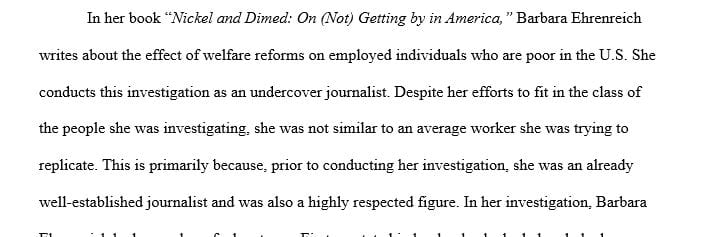Is she similar to the average worker whose life she is trying to replicate
Reading 5 – Ehrenreich. Nickel and Dimed: On (Not) Getting By in America
In this article, Barbara Ehrenreich embarks on a journey into low working class. She is interested in finding out whether the welfare reform back-to-work programs are able to lift the poor away from poverty into a prosperous life. She works several low-end jobs but the results are less than impressive. She quits her experiment after one month. What conclusions does she draw?
Is she similar to the average worker whose life she is trying to replicate? What advantages does she have?
What is her experience with co-workers, rent/rental scenarios, the type of work (server vs. housekeeper), and the work-diet/food link?
Why does she feel like a failure when quitting her experiment after a month?
Finally, what does she think about the welfare programs that try to send people back into work? What is her conclusion about the jobs that pay minimum wage?
Then reply to my classmate( at least one page)
Barbara Ehrenreich is not similar to the average worker whose life she is trying to replicate. Sure, she tries to fit in and seem like she is a part of that particular community, but in the end, Ehrenreich is not one of them. Her advantage is being able to have a good start with the appropriate amount of money to pay off rent and still have some left over for groceries and emergencies. She also, by choice, has the opportunity to experiment the lifestyle of the poor. Other people do not have the money to do something like that because their priorities are for whatever they need to survive, such as having a place to live and buying food. Ehrenreich also has stable health, stamina, a working car, and no children to care for and support prior to starting this experiment.
Ehrenreich’s experience with co-workers has been interesting. At one of her serving jobs at Jerry’s, there was one situation where a worker was on the job drunk, leading to the hotel bar being off-limits to restaurant employees. Another incident was when the dry-storage room was locked because someone who washes dishes was caught stealing items. At the housekeeping job, Ehrenreich has to deal with rude co-workers that push her around. With the rental scenarios, she has a small space to live in. Her trailer, number 46, is so small that her knees rub against the shower stall when she sits on the toilet. Her bed is also lofted so she would have to climb down to find where the floor is. According to her experience with food, Ehrenreich states that she has not “gone the lentil-stew route yet.” This is because she does not have fancy equipment to make her own food. Instead, she heats up frozen chicken with a side of beans for lunch. Her dinner is provided by the restaurant she works at, but she is still hungry by midnight. Ehrenreich also claims the server job a “plunge into poverty” and the housekeeping job her dream job. With the housekeeping job, Ehrenreich is pushed to keep working without having a break, having to suck it up and keep going. With the server job, she is always on her feet serving multiple tables at once and dealing with displeased customers.
Ehrenreich feels like a failure after quitting her experiment for a month because her initial intention to start a low-wage life was for science and she came out facing challenges that were brought onto herself. She started off with high spirits and curiosity, only to leave with “an overwhelming, dank sense of failure pressing down.” Her feeling of failure was due to the fact that because she was working two jobs, she still could not have enough leeway for new clothes or medical care. She also felt weak because with her two co-workers, Gail and Ellen, Ehrenreich almost compared herself to them because they have been working there for quite some time and still have not given up, whereas Ehrenreich dropped the jobs completely after one month.
On the welfare programs, Ehrenreich sees that “welfare recipients… will have a depressing effect on both wages and the number of jobs available… the working poor will of course be facing it without the slight, but nonetheless often saving, protection of welfare as a backup.” She thinks the welfare programs bring more hardship, stress, and deprivation to workers that only need a little bit of money to help them get by. Ehrenreich’s conclusion about the jobs that pay minimum wage is that the people that work for those jobs are worth much more than what they do while working. Those people are human and far more complex than what they earn for working a low-wage job.
reading_11._ehrenreich._nickel_and_dimmed chapter_8
Answer preview to is she similar to the average worker whose life she is trying to replicate
APA
928 words



